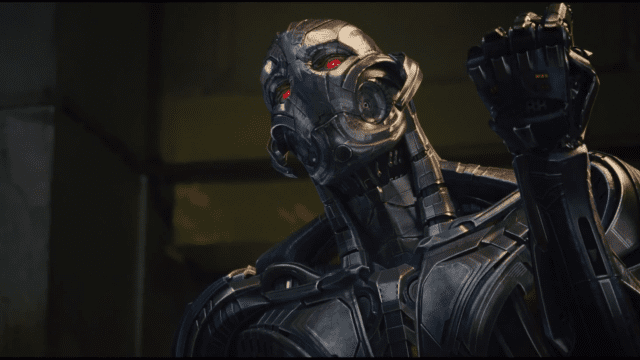How strange it must have been for Joss Whedon to make Avengers: Age of Ultron. As his swan song in the Marvel universe, he’s free to embrace his weirder tendencies – and he does – but with so many franchises to juggle, and so many sequels and new characters being introduced in the next few years, Ultron ultimately feels like a stopgap measure. It’s entertaining as hell, but it’s definitely a transitional movie for Marvel. The fact is, the announcement of Infinity War parts one and two kind of nullified anything that might happen in Ultron, but that’s Marvel’s fault for jumping the gun, not Whedon’s.
Ultron wisely begins in the middle of an action scene, as James Bond movies have done so well in the past. The Avengers are raiding a HYDRA stronghold in the fictional eastern European country of Sokovia, where Baron von Struecker is holed up with Loki’s scepter and two “enhanced”s, the genetically modified Maximoff twins, Pietro (Aaron Taylor-Johnson), aka Quicksilver, and Wanda (Elizabeth Olsen), aka Scarlet Witch. The action here is well-done but feels low-stakes; if nothing else it serves as a quick, breezy introduction to all our old pals, as well as some new enemies in the Maximoffs, who are pissed at the Avengers after their home was destroyed by a Stark Industries missile.
The scepter is retrieved, and Tony Stark hits on the idea of using its power to run his Ultron program, a “suit of armor around the world.” It’s hard to disagree with his intentions, but as Captain America points out, “Any time someone tries to stop a war before one has been started, innocent people die.” Ultron comes online and immediately – like, within seconds – decides that the best way to protect the earth it to destroy mankind. This motivation is of course canonical, but the time shift from Ultron waking up to becoming a genocidal maniac was far too compressed for me.
James Spader voices Ultron with honey-dripped menace; his delivery is at times playful, taunting, and maniacal. Whedon’s script forces Ultron to dispense quips a little too often, which lessens his menacing effect just a bit, but overall Spader’s performance is remarkable; Tom Hiddleston’s Loki was a hard act to follow in terms of villains, but Spader clearly brought his A-game. What’s most impressive about Ultron, though, is his heart. He’s in pain, and more than a little tortured; after taking Black Widow hostage, he begins explaining his plan, but not to gloat. He does it because he has no one else to talk to.
 The cast is all well represented, especially Jeremy Renner’s Hawkeye, who at times comes close to becoming Ultron‘s main character. It turns out Hawkeye has a nice little farmhouse in the country, with a wife and two kids. One can almost see Ultron as Whedon’s apology to Renner, who was famously upset after being Loki’s puppet for most of the first Avengers film. Renner makes the most of his screentime, even though he’s better at playing heavies, like in The Town or that one episode of Louie.
The cast is all well represented, especially Jeremy Renner’s Hawkeye, who at times comes close to becoming Ultron‘s main character. It turns out Hawkeye has a nice little farmhouse in the country, with a wife and two kids. One can almost see Ultron as Whedon’s apology to Renner, who was famously upset after being Loki’s puppet for most of the first Avengers film. Renner makes the most of his screentime, even though he’s better at playing heavies, like in The Town or that one episode of Louie.
Black Widow and Hulk’s romance felt shoehorned-in, Mark Ruffalo and Scarlet Johansson’s fine performances notwithstanding. They have good chemistry, great at times, but I don’t know how much Ultron needed romance. It’s Paul Bettany, though, who almost steals the show. Having voiced Iron Man’s AI JARVIS for four movies now, Bettany finally gets a chance in front of the camera, as JARVIS is embedded in an android life form called the Vision. The Vision is really the only match for Ultron, and in many ways they’re polar opposites, which makes for a fun dynamic. Vision also gets the best “holy shit” moment of the film, which I won’t spoil here.
There’s no reason you shouldn’t see Avengers: Age of Ultron. Well, statistically speaking, there’s no way you won’t see it, but if you were waiting for my recommendation, there you have it. It’s Whedon’s last film under the Marvel banner, and at times you can tell how exhausting this process is, but Whedon has earned a break. The fact that Avengers films can even exist is a testament to the man’s talent, and the fact that they’re reliably pretty good is an even better one.

